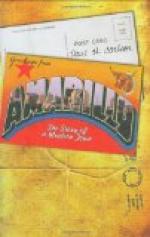Tommy, however, was not a finished orator, and Mrs. Carriswood herself deigned to help him with his graduating oration; Tommy delivering the aforesaid oration from memory, on the stage of the Grand Opera House, to a warm-hearted and perspiring audience of his towns-people, amid tremendous applause and not the slightest prod-dings of conscience.
Really the speech deserved the applause; Mrs. Carriswood, who had heard half the eloquence of the world, spent three evenings on it; and she has a good memory.
Her part in the affair always amused her; though, in fact, it came to pass easily. She had the great fortune of the family. Being a widow with no children, and the time not being come when philanthropy beckons on the right hand and on the left to free-handed women, Mrs. Carriswood travelled. As she expressed it, she was searching the globe for a perfect climate. “Not that I in the least expect to find it,” said she, cheerfully, “but I like to vary my disappointments; when I get worn out being frozen, winters, I go somewhere to be soaked.” She was on her way to California this time, with her English maid, who gave the Lossing domestics many a jolly moment by her inextinguishable panic about red Indians. Mrs. Derry supposed these savages to be lurking on the prairie outside every Western town; and almost fainted when she did chance to turn the corner upon three Kickapoo Indians, splendid in paint and feathers, and peacefully vending the “Famous Kickapoo Sagwa.” She had others of the artless notions of the travelling English, and I fear that they were encouraged not only by the cook, the “second girl,” and the man-of-all-work, but by Harry and his chum, Tommy; I know she used to tell how she saw tame buffalo “roosting” on the streets, “w’ich they do look that like common cows a body couldn’t tell ’em hapart!”
She had a great opinion of Tommy, a mystery to her mistress for a long time, until one day it leaked out that Tommy “and Master Harry, too,” had told her that Tommy’s great-grandfather was a lord in the old country.
“The family seem to have sunk in the world since, Derry,” was Mrs. Carriswood’s single remark, as she smiled to herself. After Derry was dismissed she picked up a letter, written that day to a friend of hers, and read some passages about Harry and Tommy, smiling again.
“Harry”—one may look over her pretty shoulder without impertinence, in a story—“Harry,” she wrote, “is a boy that I long to steal. Just the kind of boy we have both wanted, Sarah—frank, happy, affectionate. I must tell you something about him. It came out by accident. He has the Western business instincts, and what do you suppose he did? He actually started a wee shop of his own in the corner of the yard (really it is a surprisingly pretty place, and they are quite civilized in the house, gas, hot water, steam heat, all most comfortable), and sold ‘pop’ and candy and cakes to the boys. He made so much money




